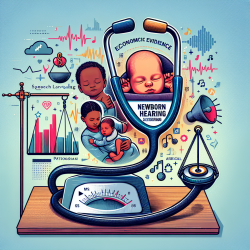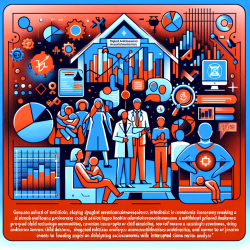Empowering Change: Harnessing Transdisciplinary Research for a Healthier Future
In the ever-evolving landscape of speech-language pathology, practitioners are continually seeking innovative ways to improve outcomes for children. The research article, "Transdisciplinary Research Priorities for Human and Planetary Health in the Context of the 2030 Agenda for Sustainable Development," provides a compelling framework for integrating sustainable development goals into our practice. This blog explores how practitioners can leverage these insights to enhance their skills and contribute to a healthier future for both humans and the planet.
The Intersection of Human and Planetary Health
The research underscores the intricate link between human health and the health of our planet. As speech-language pathologists, understanding this connection is crucial. The state of Earth's life-support systems—such as water, biodiversity, and climate—directly impacts human health. Conversely, human activities can adversely affect these natural systems. By adopting a transdisciplinary approach, practitioners can address these challenges holistically.
Key Research Themes for Practitioners
The research identifies four main themes that are pivotal for practitioners:
- Risk Identification and Management: This involves understanding the risks related to water, hygiene, sanitation, and climate change. Practitioners can integrate these considerations into their therapeutic approaches, ensuring that interventions are both effective and sustainable.
- Strengthening Climate-Resilient Health Systems: Building robust health systems that can withstand environmental changes is essential. Speech-language pathologists can advocate for and implement practices that support climate resilience in their work settings.
- Monitoring, Surveillance, and Evaluation: Continuous monitoring and evaluation of health outcomes are crucial for adapting to environmental changes. Practitioners can utilize data-driven approaches to assess the impact of their interventions and make informed decisions.
- Risk Communication: Effective communication is key to managing health risks. Practitioners can develop strategies to educate and empower children and their families about the importance of sustainable practices.
Implementing Transdisciplinary Approaches
To effectively implement these research outcomes, practitioners should embrace transdisciplinary research approaches that are:
- Inclusive and Equitable: Consider the diverse needs of children from different backgrounds and ensure that interventions are accessible to all.
- Multi-Scalar: Address health challenges at both local and global levels, recognizing the interconnectedness of these issues.
- Broadly Communicated: Share knowledge and insights with a wide audience, including families, educators, and policymakers, to foster collaborative efforts.
Encouraging Further Research
Practitioners are encouraged to delve deeper into the research and explore how they can contribute to sustainable development goals. By staying informed and engaged with the latest findings, speech-language pathologists can play a pivotal role in promoting both human and planetary health.
To read the original research paper, please follow this link: Transdisciplinary Research Priorities for Human and Planetary Health in the Context of the 2030 Agenda for Sustainable Development.










